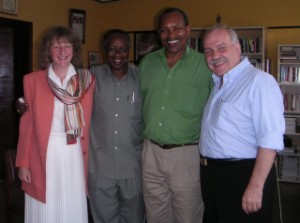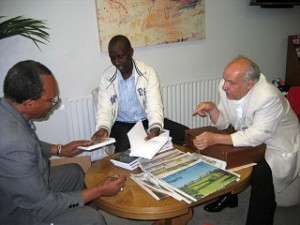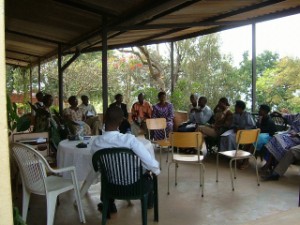Bringing Healing to Rwanda
The death of over one million people in just one hundred days in the spring of 1994 also left hundreds of thousands of women abused and infected with AIDS, and several hundred thousand children as orphans.
The consequences have not gone away. In fact after more than twenty years we are still seeing a range of physical and emotional illnesses that are unparalleled in Africa.
What is worse is that the Great Lakes region of Central East Africa continue to be a bloodbath – The Congo, Southern Sudan/Darfur, Uganda and now even Kenya!
We have been invited to help the Rwandese people. Over the last two years we have helped them design a sustainable program of ‘experts-by-experience’, drawing from our own work with the therapeutic community movement and the Community of Communities programme with the Royal College of Psychiatrists.
After a successful trial this trauma recovery program is now ready to be launched to enable the Rwandese to help each other find healing and wholeness. We are currently seeking funding of around $5 million to launch a pilot program, following successful trials.
Some of the Problems in Rwanda
This part of Africa is suffering in a range of ways. Famine, natural disaster, roving militia and corrupt governments are just a few of the challenges. But in Rwanda it is even more complex. The genocide was so widespread and so sudden that many thousands are still suffering from post-traumatic shock.
In a country that has experienced significant revival in the 20th century, perhaps one of the biggest tragedies is that the Church was, in some areas, complicit in the genocide. It has much ground to re-take.
Even now the militia is still active and the threat of further mass murders lurks on the borders. Many live in fear, so are unwilling to speak the truth of what happened either to them, their families or their communities.
The trauma of the genocide means many are still emotionally carrying the damage that is worsening in them. The country has no nationwide program of mental health or social work. So many suffer in silence and the pain expresses itself in numerous ways. We are witnessing this in a range of illnesses, like cancers and heart disease, that were previously unknown in this part of Africa.
One of the most difficult problems is that many, especially women, have few safe places and safe people they can be honest with.
There are no easy answers.
Our Response
After several years of research we have designed an indigenous and sustainable Christ-centred lay-led community-based mental health program, with a healthy living philosophy, suitable for replication throughout the country.
Our programme has been created by the Rwandese people and will be staffed by them. We have two partners; The Anglican Church, represented by His Grace Emmanuel M Kolini, Archbishop of the Anglican Church of Rwanda and the Rwanda National Decade for the Disabled, represented by their President, Dr James Ndahiro, MP. We also have the proactive support of the Minister for Education.
Our partners have asked us to set up a training centre, to act as a safe place and begin training local people to help each other. We will use a workshop model, similar to those that are already so successful in UK and USA, to empower local people to support each other in dealing therapeutically with the extensive mental health needs caused by the genocide and its legacy.
By meeting in small local groups after the workshops, participants will begin to practice what they have learned, and become ‘experts-by-experience’. They will then be able to offer support to others. The program is designed to replicate itself.
From the local groups, our partners will recruit a number of trainees. We will put them through an intensive training program so they can deliver workshop sessions and train each other. They will also begin seeking to raise awareness of the need for a long-term comprehensive mental health strategy throughout Rwanda and then across East Africa.
Although open to all victims of violence the project will specifically offer hope and services to the disabled and those young people orphaned in the genocide, many of whom are now seeking to enter university or to take on their first jobs.
‘We would like you to stand with us’
You can help in a number of ways, and we list some of these in the back of our book on Rwanda, Christ Walks Where Evil Reigns (page 167ff.)
The chief need is for you to stand with us in prayer for the building of this program across East Africa.
But you can also financially support us on a regular basis. To set up the training centre and run it over three years with an ongoing programme of workshops will cost $5million. This will create a team of experts-by-experience who will be able to continue bringing healing and wholeness to the hundreds of thousands across the country who are still locked in trauma from the genocide.
Any gift will be welcome, large or small. If you mention that it is specifically for our Rwandese program, we will make sure it is used to help birth the project. If you are interested you can donate here.
But there are numerous other things you can do. For instance you can buy a copy of the Rwanda book for yourself. You can also pay a little extra for an autographed copy, so the Life Giving Trust benefits with your gift. Or you could buy and give a copy to a friend who may be interested in our ministry? We can autograph this book and post directly to them from you?
Also, we would be delighted for you to talk to us about any part that you think you may be able to play in supporting this program.
If you would like us to visit your church or to speak more about the program, or talk about bringing healing and wholeness to victims of violence, please do contact us.

Susan, Bishop John, His Grace Emmanuel Kolini Archbishop of Rwanda, and Peter


